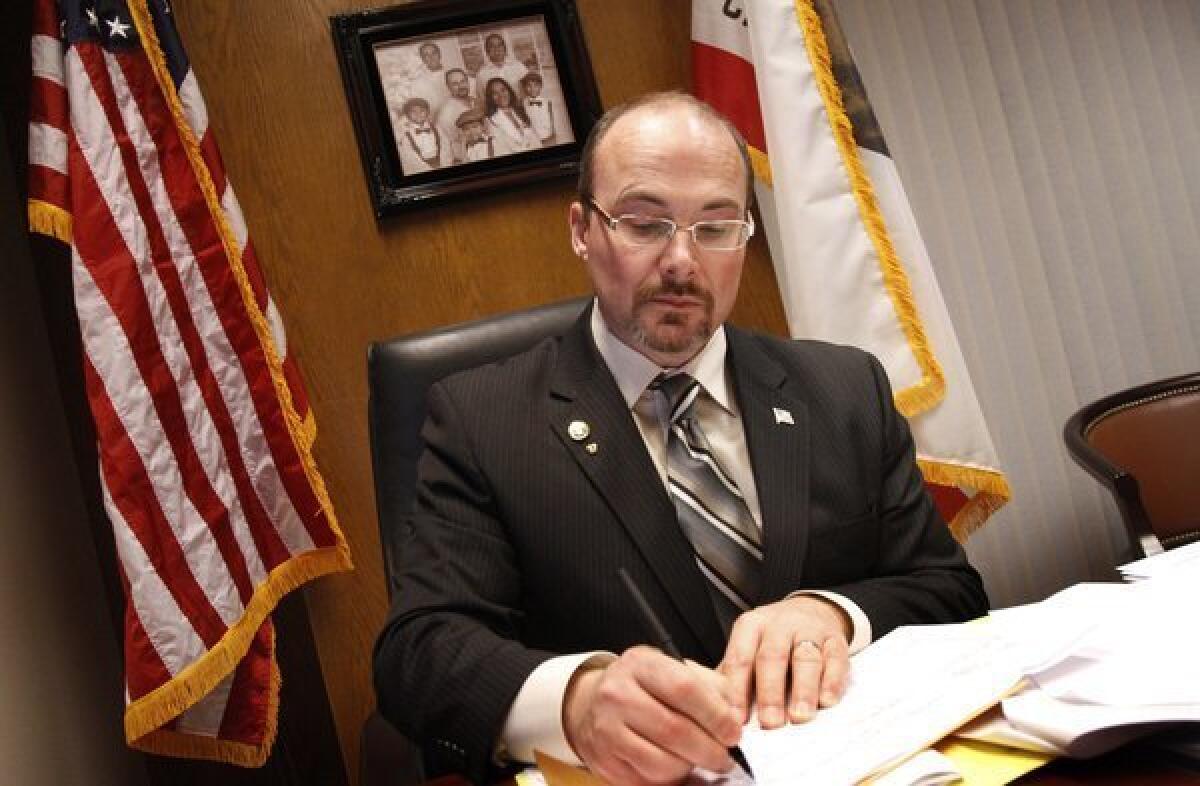Legislature stepping away from drug war

- Share via
SACRAMENTO — If you get busted using methamphetamine, the D.A. can charge you with a misdemeanor or a felony. His choice. But if you’re caught with cocaine or heroin, there’s no option. It’s a felony.
If there’s logic in that, it escapes me. They’re all addictive and destructive to mind and body.
Get high on one hard drug and you might receive a get-out-of-jail-free card. But another earns you a lifetime bad-guy tag.
The Legislature, as it rushes toward adjournment of its annual session Friday, is moving to correct that puzzling contradiction.
It is retreating a bit from the decades-long war on drugs.
“The war on drugs is a colossal failure,” says Assemblyman Tim Donnelly (R-Twin Peaks).
Yes, that Tim Donnelly, arguably California’s most conservative state lawmaker, a self-proclaimed tea party Republican and one-time Minuteman vigilante who patrolled the border searching for Mexicans entering the U.S. illegally.
Donnelly last week cast a crucial vote that secured Assembly passage of a drug-sentencing bill by liberal Sen. Mark Leno (D-San Francisco). The measure now awaits Senate approval of Assembly amendments, then will be sent to Gov. Jerry Brown. No telling his view.
The bill, SB 649, would provide prosecutors the flexibility to treat all low-level drug possession offenses as either a misdemeanor or a felony — what’s known as a “wobbler.”
“We give nonviolent drug offenders long terms, offer them no treatment while they’re incarcerated and then release them back into the community with few job prospects or options to receive an education,” Leno says.
His bill, he continues, would allow local governments to reduce lockup costs and spend their money on drug rehabilitation, mental health services and probation, “reserving limited jail space for serious criminals.”
Simple possession for personal use of meth already is a wobbler. This bill would add other hard drugs such as crack cocaine, powder cocaine and heroin.
It wouldn’t affect sellers or manufacturers of hard drugs. Those crimes would remain felonies.
And users who steal or rob to finance their drug habits still would face felonies.
If it were left to him, Leno would make all drug possession offenses a misdemeanor. Thirteen other states have done that, varying widely from New York and Massachusetts to Wyoming and Mississippi.
“On average,” the senator says, “reducing penalties to misdemeanors has resulted in lower drug use, higher rates of drug treatment participation and even less property and violent crime.”
Leno sponsored a misdemeanor-only bill last year, and it failed miserably on the Senate floor.
Some liberals would legalize all drug use. That would be foolish. People — especially kids — should not be able to just walk into a Safeway and get blotto. Alcohol is bad enough. These are not “victimless” crimes. They destroy families.
It’s important to remember that Leno is not proposing legalization, or even treating hard drugs like marijuana. Smoking pot in California, at worst, is considered an infraction, like a traffic ticket. No one gets jailed these days for toking weed.
Not many are even locked up in state prison solely for possessing hard drugs — only 827 out of 133,000 total inmates, according to the state corrections department. All were sentenced before Brown’s 2011 “realignment” that shifted incarceration of most low-level offenders to local jails.
Drug users now are sent to state prison only if they’ve previously been convicted of a serious or violent crime.
But Leno’s bill could help relieve local jail crowding. Someone can be sentenced for up to three years for felony drug possession. But he’d serve only a year, at most, for a misdemeanor and probably be ordered into drug treatment upon release. Or perhaps he’d only be sentenced to treatment and probation, with no jail time.
Felons are branded for life. They can’t obtain a college grant and are lucky to find a minimum wage job. If only convicted of a misdemeanor, however, they’ve got a much better chance of assimilating into the productive workforce.
“I’m deeply conflicted,” Donnelly told the Assembly. “I know that’s probably a shock to many of you.”
The San Bernardino County lawmaker recalled leading Bible study and teaching life skills in a prison fire camp, indicating he was impressed by many inmates. “Do we want to fill our [cells] with people who really need to go and get serious treatment?” he asked.
Donnelly announced that he would abstain from voting, then changed his mind when the bill fell short of the simple majority needed for passage.
But before voting, the conservative told me, he consulted with an ACLU lobbyist — certainly a first.
The bill passed with no votes to spare, 41 to 31. Seven Democrats opposed it. One other Republican supported the measure, freshman Assemblyman Rocky Chavez of Oceanside.
The GOP consensus was articulated by Assemblyman Donald P. Wagner (R-Irvine). The bill “minimizes the consequences of addictive behavior,” he said. “We need to maintain strong laws.”
But outside Sacramento, conservatives are changing their tune on this issue.
A group called Right on Crime, a Texas-based think tank, recently declared that “it makes sense to use shorter terms and provide meaningful treatment” for low-level drug possession offenders.
“Nearly all of us know someone who has struggled with addiction” but has no other criminal record, the group said. “And it would be difficult to imagine that individual … being incarcerated next to violent criminals.”
The group’s website includes supportive quotes from Texas Gov. Rick Perry, former U.S. House Speaker Newt Gingrich, anti-tax crusader Grover Norquist and former U.S. Atty. Gen. Edwin Meese, a onetime California prosecutor.
Leno’s bill provides two new weapons in the war on drugs: compassion and common sense.
More to Read
Sign up for Essential California
The most important California stories and recommendations in your inbox every morning.
You may occasionally receive promotional content from the Los Angeles Times.











